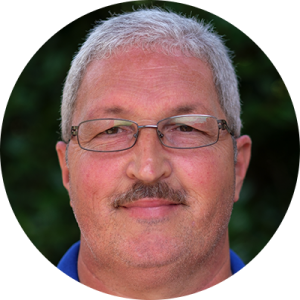Networks of Support
Donald Edwards
Chief of Police, City of Clinton
Donald Edwards has served as an integral part of the Clinton Police Department for 24 years, beginning as a police officer and progressing to the position of captain, and later, assistant chief. In 2017, he reached the pinnacle of his department when he was named police chief.
“My whole life has been in law enforcement,” Edwards said. “It’s the only real job I’ve actually had. Once I moved into a position of leadership, I wanted a good program that would help me grow and develop as a leader.”
Edwards had done a variety of law enforcement-centric trainings and education courses, but City Manager Tom Hart pointed Edwards in a new direction when he encouraged him to apply for the LGFCU Fellows program. The experience was transformative for Edwards as an individual leader, and one specific exercise made a particular impact on his experience—and his career.
During a peer coaching exercise, each member of a small group was tasked with sharing a challenge they were experiencing in their current role. They were then instructed to turn around and other members of the group discussed the issue without any input from the original speaker. It was a profound and eye-opening experience for Edwards and the other members of his breakout group, who were particularly struck by the value of hearing honest feedback and discussion from a diverse set of peers peers who serve in different areas of local government.
“Sometimes, if you’re only getting input from one profession, it can lead to limited thinking,” Edwards said. “Having input from the others gave me a fresh perspective on the challenges we were facing.”
The exercise made such an impression on the group of five Fellows that, upon its completion, they made a commitment: “Let’s keep doing this after the Fellows program.”
For two years the group has stuck to their pledge, meeting virtually once per month. Members of the group discuss any challenges or problems they are facing, receive feedback, and encourage each other. They set timelines for action and hold each other accountable to those actions. They also maintain strict confidentiality in order to encourage honest conversation. The original group of five has even expanded, adding a sixth member after a conversation at the 2020 alumni conference.
“I appreciate the friendships I’ve gained across the state,” Edwards said. “But this group in particular is where I’ve stayed connected and engaged in work and life. When you’re in a leadership role, you can’t always talk about some of your concerns with people. Having that outside group for connection and feedback has been so beneficial.”
That peer support was also a crucial source of community during the COVID-19 pandemic, which brought high levels of stress and isolation to the daily lives of many local government officials.
“Talking to our group reminded each of us that we weren’t in a bubble and we weren’t dealing with these challenges all on our own,” Edwards said. “We could share how we were working and coping and talk about how our work was changing due to the pandemic.”
The support and insight of Edwards’s peer group has been critically important in the past year, and he has also relied on his Fellows education to prepare him for the challenges of leading in crisis. That included leading his team during the pandemic and leading within the community during protests for racial justice
“You can’t police from home,” Edwards said. “We still needed to be out in our community, and our team was dealing with many stresses and tensions, including concerns about daycare and more. I had to know myself in order to lead. Fellows gave me so much learning and growth in this area. When you’re leading, you have so many different dynamics and every situation is unique—both on our team and in the community. We have to be open to the community, to listen to their concerns, and have ways to provide open and honest feedback.”
In a year filled with difficult situations, LGFCU Fellows supported leaders like Edwards with the tools necessary to effectively lead in their organizations and communities.
“It’s hard to put into words how special this program is,” Edwards said. “It’s like becoming part of a family, and I feel that both personally and professionally. There’s nothing we shied away from in the classroom or our alumni conferences. Saying ‘thank you’ is simply not enough.”


